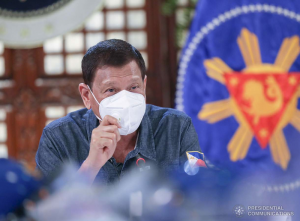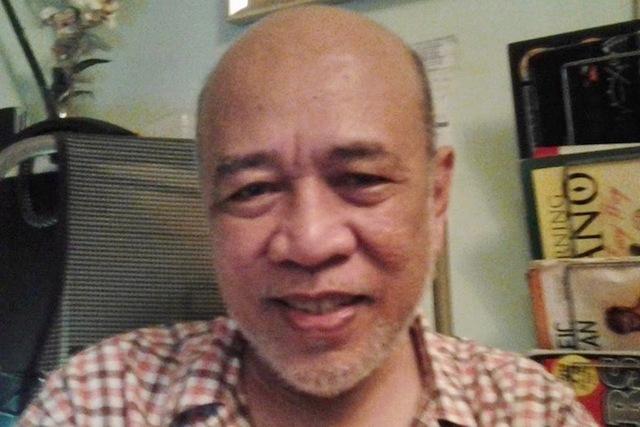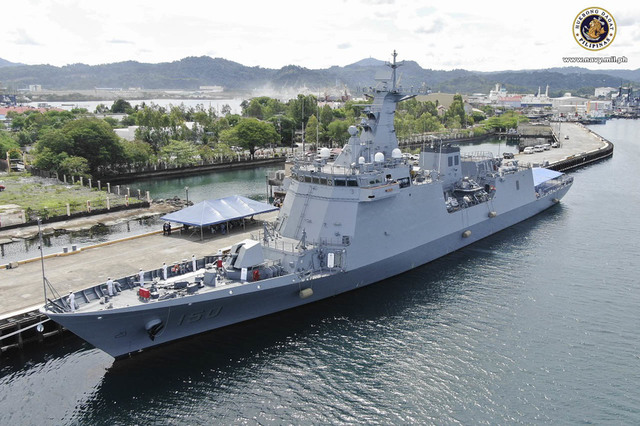
Egyptian national Fehmi Lassoued is presented to the media at police headquarters in Quezon City, Philippines, after being arrested, allegedly with explosives and bomb-making paraphernalia, Feb. 19, 2018. Reuters
An anti-terrorism law recently signed by Philippine President Rodrigo Duterte is necessary to combat Islamic State-linked militants, a well-known security expert said Friday, amid criticisms it could be used to weaken human rights in the country.
Sidney Jones, director of the Institute for Policy Analysis of Conflict, said that while the law signed last week might not be a silver bullet for the country’s extremism problems, it gives state enforcers a better tool to legally and properly address terrorism, compared to the weak 2007 Human Rights Security Act it replaces.
“At least this should help in trying to keep people in custody while the process of investigation can go forward without having to result in phony charges and fake evidence,” Jones told the Foreign Correspondents Association of the Philippines in an online forum.
Jones said the country was still a “hotspot” for terrorism in Southeast Asia, with key players maintaining close ties with the so-called Islamic State group (IS).
“Philippines remains the regional hotspot and continues to be a more dangerous terrorist center than anywhere else in the region. That is the context for the new law, flawed as it is,” she said.
In the same forum, Lt. Gen. Cirilito E. Sobejana, head of Armed Forces of the Philippines’ Western Mindanao Command, allayed fears that the law would be abused to crush dissent and oppress civil rights.
Dialogue
He said that while the law gave government more teeth to eradicate and address terrorism, there were several provisions in place to ensure that rights would be protected.
Jones said that fears about state forces being granted sweeping powers were understandable, especially for residents of Mindanao, the southernmost island group in the Philippines. The military and the community should hold a dialogue to address each other's concerns, she said.
Sobejana said a community dialogue started this Friday morning.
“We have started it already. We don’t want to violate any human rights law while we implement the Anti-Terror Law,” he said. “Besides, we should not compare our Armed Forces before to what we have right now. I should say, with all modesty, that our AFP today is more professional and more matured.”
Local and international groups have expressed concern that the measures bolster the power of security officers to arrest, detain and file charges. Two contentious provisions of the law allow the detention of suspects for 24 days, and arrest without a warrant.
“I think the first thing to say [is], there isn’t a single terror law anywhere in the world that is completely satisfactory, and there isn’t anyone that made a perfect balance between human rights and what you may call repressive measures,” Jones said. “This law replaces one of the worst anti-terrorism laws that was never used or almost never used.”
Latest suspected IS attack
On Thursday, a policeman and his civilian driver were killed in a roadside bombing blamed on Filipino militants with links to the IS in the town of Shariff Aguak in the southern Philippines.
Local army spokesman Lt. Col. Anhouvic Atillano said a group of police officers and their driver were heading back to their headquarters when the attack occurred.
Killed were police Master Sgt. Antonio Balasa and the driver. Four other officers were injured and rushed to a nearby hospital, where they were said to be in critical condition.
“Our primary suspects here are the militants operating in the area,” he said, referring to the Bangsamoro Islamic Freedom Fighters (BIFF), Muslim militants who have links to the IS.
The mayor of Shariff Aguak, Marop Ampatuan, condemned the attack and offered a bounty for the arrest of the suspects.
“Let us not allow terrorism to prevail in our town,” he said.
The incident was the second deadly clash with BIFF suspects in Mindanao since July 2, when attackers killed a police officer manning a quarantine checkpoint near the nearby town of Esperanza.
https://mail.google.com/mail/u/0/?tab=rm&ogbl#inbox/FMfcgxwJWjGKPRlMrWjFBWRrlZmRVPld
Sidney Jones, director of the Institute for Policy Analysis of Conflict, said that while the law signed last week might not be a silver bullet for the country’s extremism problems, it gives state enforcers a better tool to legally and properly address terrorism, compared to the weak 2007 Human Rights Security Act it replaces.
“At least this should help in trying to keep people in custody while the process of investigation can go forward without having to result in phony charges and fake evidence,” Jones told the Foreign Correspondents Association of the Philippines in an online forum.
Jones said the country was still a “hotspot” for terrorism in Southeast Asia, with key players maintaining close ties with the so-called Islamic State group (IS).
“Philippines remains the regional hotspot and continues to be a more dangerous terrorist center than anywhere else in the region. That is the context for the new law, flawed as it is,” she said.
In the same forum, Lt. Gen. Cirilito E. Sobejana, head of Armed Forces of the Philippines’ Western Mindanao Command, allayed fears that the law would be abused to crush dissent and oppress civil rights.
Dialogue
He said that while the law gave government more teeth to eradicate and address terrorism, there were several provisions in place to ensure that rights would be protected.
Jones said that fears about state forces being granted sweeping powers were understandable, especially for residents of Mindanao, the southernmost island group in the Philippines. The military and the community should hold a dialogue to address each other's concerns, she said.
Sobejana said a community dialogue started this Friday morning.
“We have started it already. We don’t want to violate any human rights law while we implement the Anti-Terror Law,” he said. “Besides, we should not compare our Armed Forces before to what we have right now. I should say, with all modesty, that our AFP today is more professional and more matured.”
Local and international groups have expressed concern that the measures bolster the power of security officers to arrest, detain and file charges. Two contentious provisions of the law allow the detention of suspects for 24 days, and arrest without a warrant.
“I think the first thing to say [is], there isn’t a single terror law anywhere in the world that is completely satisfactory, and there isn’t anyone that made a perfect balance between human rights and what you may call repressive measures,” Jones said. “This law replaces one of the worst anti-terrorism laws that was never used or almost never used.”
Latest suspected IS attack
On Thursday, a policeman and his civilian driver were killed in a roadside bombing blamed on Filipino militants with links to the IS in the town of Shariff Aguak in the southern Philippines.
Local army spokesman Lt. Col. Anhouvic Atillano said a group of police officers and their driver were heading back to their headquarters when the attack occurred.
Killed were police Master Sgt. Antonio Balasa and the driver. Four other officers were injured and rushed to a nearby hospital, where they were said to be in critical condition.
“Our primary suspects here are the militants operating in the area,” he said, referring to the Bangsamoro Islamic Freedom Fighters (BIFF), Muslim militants who have links to the IS.
The mayor of Shariff Aguak, Marop Ampatuan, condemned the attack and offered a bounty for the arrest of the suspects.
“Let us not allow terrorism to prevail in our town,” he said.
The incident was the second deadly clash with BIFF suspects in Mindanao since July 2, when attackers killed a police officer manning a quarantine checkpoint near the nearby town of Esperanza.
https://mail.google.com/mail/u/0/?tab=rm&ogbl#inbox/FMfcgxwJWjGKPRlMrWjFBWRrlZmRVPld








































